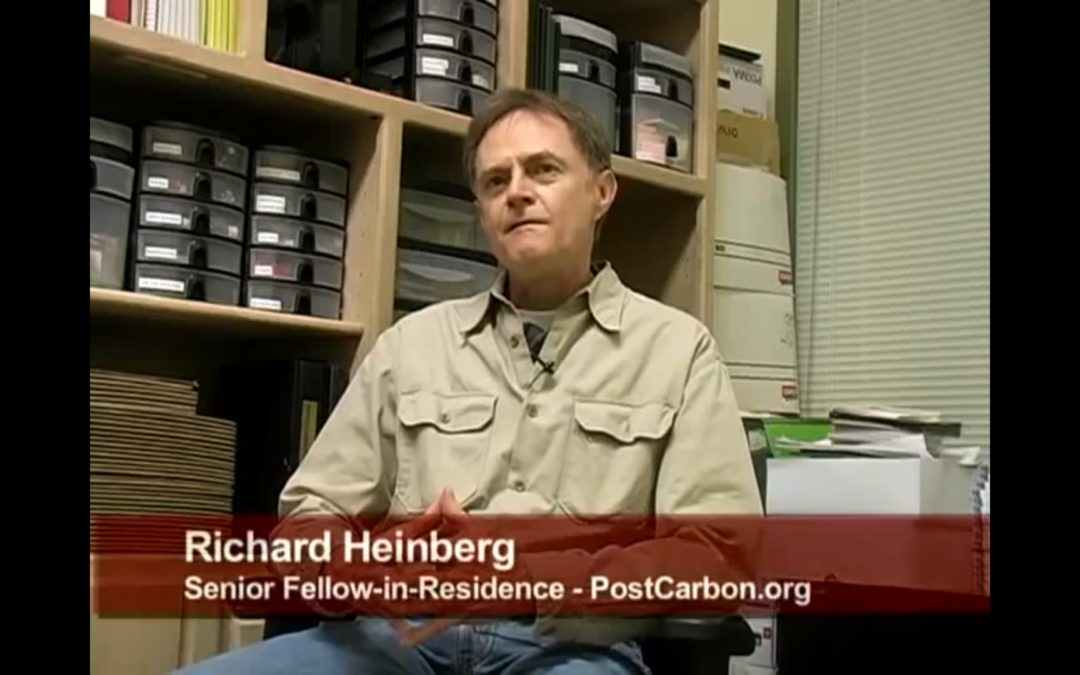
by Shaun Chamberlin | Mar 15, 2010 | All Posts, Cultural stories, Peak Oil, Politics, Reviews and recommendations, TEQs (Tradable Energy Quotas)
See below for an interview with the ever-insightful Richard Heinberg, discussing where we should put our efforts in the aftermath of the failure of the Copenhagen climate summit. It is well worth a watch, and you might want to consider spreading it to your contacts via the "Share This" link in the bottom right corner of this post.
I heartily endorse his perspective, but disagree when he argues in support of carbon taxation at around fifteen minutes in, saying that "we need to make fossil fuels more expensive". In my opinion, we do not - we need to guarantee a fair entitlement to the available energy, not ration it by the depth of people's pockets.
As Richard says, "if you're taxing everybody on their use of fossil fuels - raising their cost of living - it's pretty hard to get their buy-in to that", but once you guarantee people a fair entitlement, in line with a declining cap, society can then collectively focus on keeping the price of energy as low as possible, which is a simply-understood task that everyone can buy into with enthusiasm.
Richard is touching on a widely-unrecognised contradiction at the heart of present energy/climate policy discussions - the desire to raise carbon prices while keeping energy prices low. Market-based approaches struggle to see past this, but TEQs would resolve it at a stroke, through the recognition that reducing the quantity of carbon emissions can be best achieved by means other than a high price.
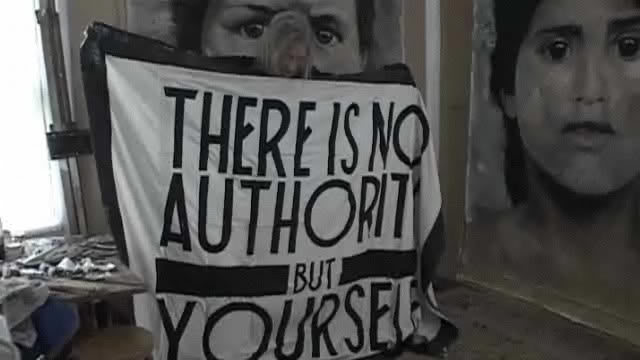
by Shaun Chamberlin | Jan 18, 2010 | All Posts, Cultural stories, Philosophy, Politics, Reviews and recommendations
I just stumbled across this documentary (English with Dutch subtitles) following the story of the 70s/80s punk band Crass. They are still living wholeheartedly by their Do It Yourself ethos and "There is no authority but yourself" philosophy. A recommended watch.
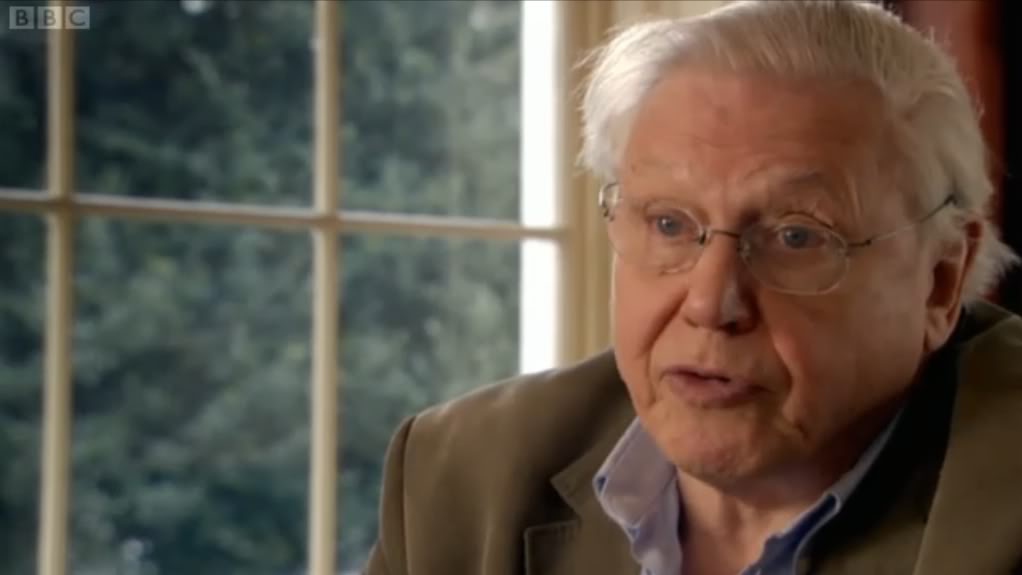
by Shaun Chamberlin | Dec 14, 2009 | All Posts, Reviews and recommendations
I recommend David Attenborough's excellent documentary How Many People Can Live on Planet Earth?, which can be viewed on BBC iPlayer here for the next four days on YouTube here. He observes that the human population has increased from 2.5 billion to nearly 7 billion in his lifetime, and begins to ask some of the key questions about how we might respond to the challenges that brings.
It was interesting to note, however, that despite the litany of limiting factors on future population growth described in the programme, it was universally agreed that our numbers will surely increase by another couple of billion or so.
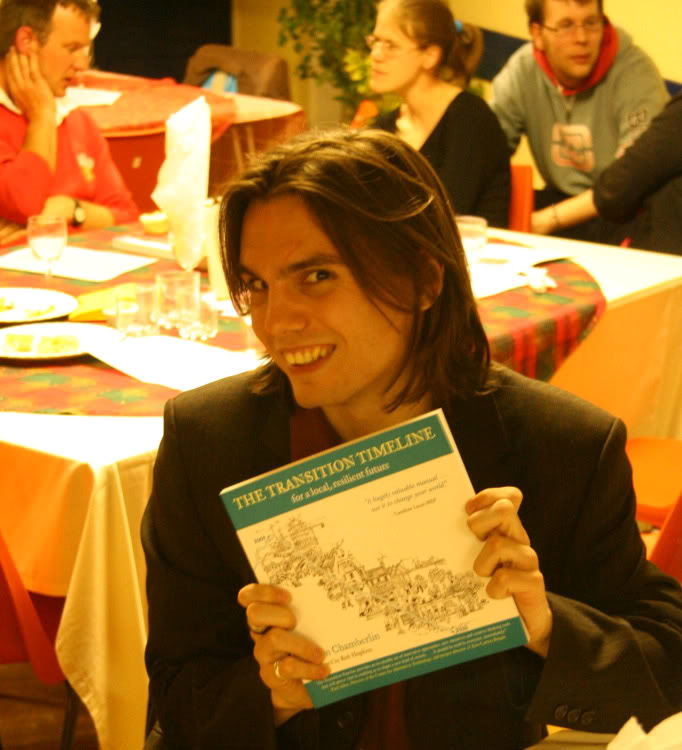
by Shaun Chamberlin | Jun 4, 2009 | All Posts, Climate Change, Cultural stories, Favourite posts, Peak Oil, Politics, Reviews and recommendations, TEQs (Tradable Energy Quotas), The Transition Timeline, Transition Movement
It has been another crazy whirlwind of a month, with this weekend set to be the first in five which I get to spend in Transition Town Home, having spoken recently in Bungay, Glastonbury, Belsize Park and the Forest of Dean, as well at the Transition Conference (I hate that name, can't we call it a 'Gathering' or something?) in Battersea, and at the Sunrise Celebration Festival.
One highlight for me was watching the world première of the movie "In Transition" and being surprised and delighted to find that I was in it (having completely forgotten the quick interview they grabbed with me at my book launch!). Another was meeting an A-Level teacher who is already using my book as a teaching aid for his Environmental Design students.
But perhaps of wider interest was the fact that Ed Miliband, Secretary of State for Energy and Climate Change, turned up at the Transition Conference as a 'keynote listener', but still managed to drop a few bombshells.
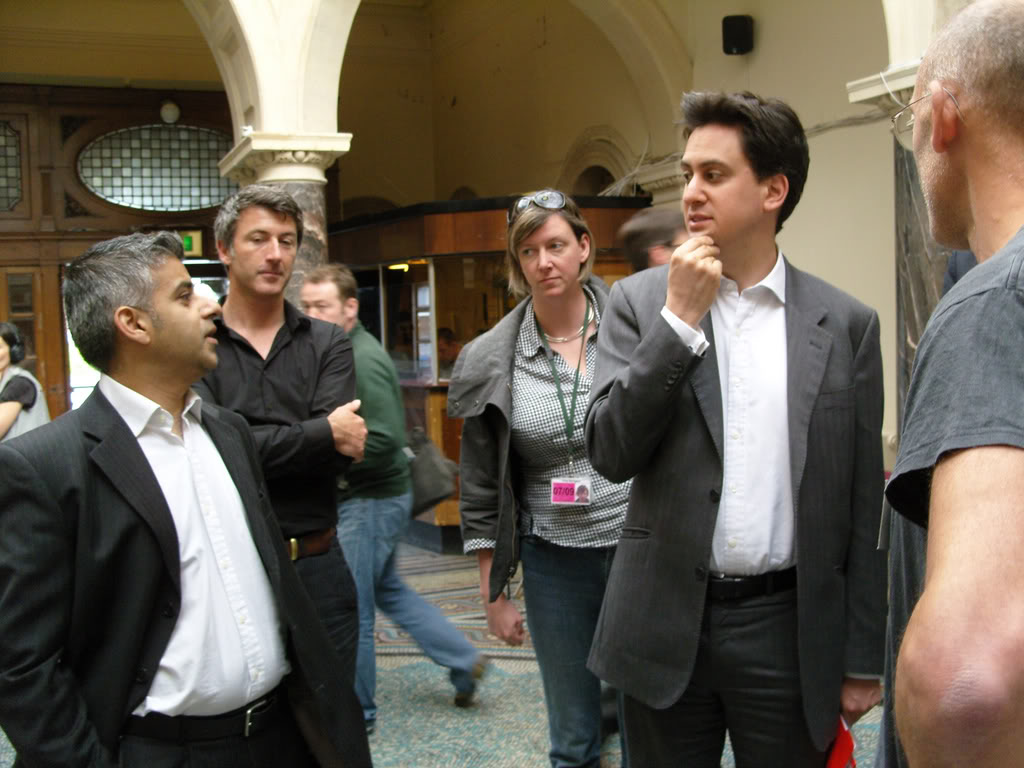 When we buttonholed him for a bit of a chat (audio here, courtesy of Traydio.com), I was pleased to hear that he understood the need for Government to remain a step removed from the Transition movement in order to avoid "strangling" it. However, I must confess I had to refrain from gasping as he declared that:
"If you think about the history of the debate on peak oil as I understand it, climate change makes debate about peak oil a bit of a second-order debate, because we have to start making the transition to low carbon forms of energy in any case. Whether you think that peak oil's in 2020, 2030 or 2040... I don't need to have the debate about peak oil... to know that we have to start making the transition as quickly as possible."
Where to begin? Clearly Ed's understanding of the history of the peak oil debate differs a little from mine. Let's start with the obvious - with many experts agreeing that we likely saw peak oil last year, for our Minister for Energy to be pondering how many decades in the future it might lie is, frankly, terrifying.
But what I personally find even more worrying is that he (and thus presumably his department) has not yet grasped that climate change and peak oil often pull in opposite directions. Perhaps Ed should cast his eyes across the Atlantic to the US Congress, where the advocates of Climate Change Bills (to implement strict carbon budgets) are doing battle with the champions of Energy Independence Bills (to subsidise carbon-intensive tar sands and coal-to-liquids projects).
When we buttonholed him for a bit of a chat (audio here, courtesy of Traydio.com), I was pleased to hear that he understood the need for Government to remain a step removed from the Transition movement in order to avoid "strangling" it. However, I must confess I had to refrain from gasping as he declared that:
"If you think about the history of the debate on peak oil as I understand it, climate change makes debate about peak oil a bit of a second-order debate, because we have to start making the transition to low carbon forms of energy in any case. Whether you think that peak oil's in 2020, 2030 or 2040... I don't need to have the debate about peak oil... to know that we have to start making the transition as quickly as possible."
Where to begin? Clearly Ed's understanding of the history of the peak oil debate differs a little from mine. Let's start with the obvious - with many experts agreeing that we likely saw peak oil last year, for our Minister for Energy to be pondering how many decades in the future it might lie is, frankly, terrifying.
But what I personally find even more worrying is that he (and thus presumably his department) has not yet grasped that climate change and peak oil often pull in opposite directions. Perhaps Ed should cast his eyes across the Atlantic to the US Congress, where the advocates of Climate Change Bills (to implement strict carbon budgets) are doing battle with the champions of Energy Independence Bills (to subsidise carbon-intensive tar sands and coal-to-liquids projects).
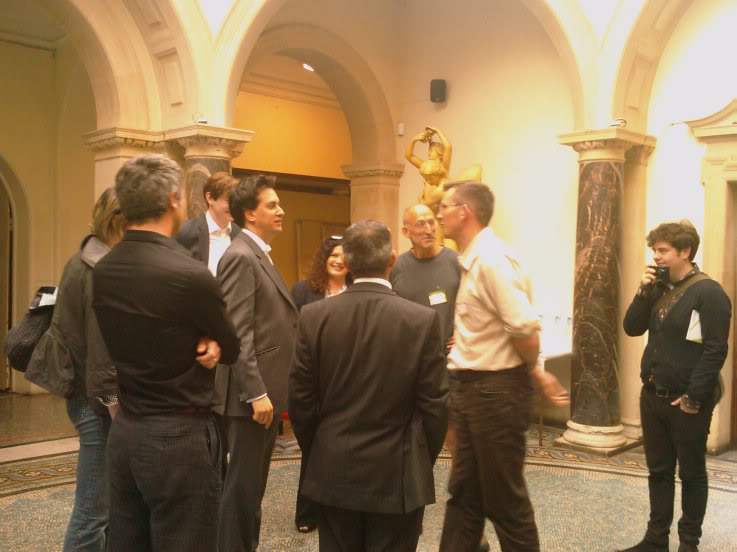 As I wrote here last year, and more recently in The Transition Timeline, there is a very real tension between addressing climate change and addressing peak oil, and policy based purely on one side of this equation could be very destructive indeed. Unfortunately, our government is still caught on the horns of this 'supply side dilemma', and is desperately casting around for more rapidly-deployable low-carbon energy supplies.
It is only slowly dawning on them that renewable supply cannot increase as fast as oil and gas are declining, that nuclear only makes the problem worse, and that coal is not an option if we want a habitable planet. The inescapable conclusion is that if we are to treat climate change with the seriousness which it undoubtedly deserves, then we may well have already entered our years of energy descent. The only reasonable response is to find ways to thrive in this context - to reduce energy demand in line with the reducing supply - but as yet Ed still believes that only Denial sells to the voting public:
"In a way I'm less optimistic than you are... you're optimistic that you can persuade people to adopt a sort of "no growth" model of society - I'm pretty convinced that you couldn't persuade people of that... Even if you were right about your model of society, I just don't believe that you're going to convince people of that"
Actually, I do agree with Ed that we need to think long and hard about what "economic growth" actually means before we debate whether we want it, though I'm not sure we'll see eye-to-eye when that debate reaches its head.
Of course it doesn't come as an overwhelming surprise to see my perspective deemed darker yet more optimistic than the Government view, but since the Transition Vision of the future seems about the only desirable outcome out there to shoot for, I think I'll just keep right on shooting, whether Ed rates our chances or not.
Having said that, with Rob's recent post on 'burn out' in mind, it's definitely time for a day off for me. Tomorrow is my birthday, and I will be taking a hard-earned breather at Kew Gardens with my beautiful and inspirational girlfriend. Back soon!
As I wrote here last year, and more recently in The Transition Timeline, there is a very real tension between addressing climate change and addressing peak oil, and policy based purely on one side of this equation could be very destructive indeed. Unfortunately, our government is still caught on the horns of this 'supply side dilemma', and is desperately casting around for more rapidly-deployable low-carbon energy supplies.
It is only slowly dawning on them that renewable supply cannot increase as fast as oil and gas are declining, that nuclear only makes the problem worse, and that coal is not an option if we want a habitable planet. The inescapable conclusion is that if we are to treat climate change with the seriousness which it undoubtedly deserves, then we may well have already entered our years of energy descent. The only reasonable response is to find ways to thrive in this context - to reduce energy demand in line with the reducing supply - but as yet Ed still believes that only Denial sells to the voting public:
"In a way I'm less optimistic than you are... you're optimistic that you can persuade people to adopt a sort of "no growth" model of society - I'm pretty convinced that you couldn't persuade people of that... Even if you were right about your model of society, I just don't believe that you're going to convince people of that"
Actually, I do agree with Ed that we need to think long and hard about what "economic growth" actually means before we debate whether we want it, though I'm not sure we'll see eye-to-eye when that debate reaches its head.
Of course it doesn't come as an overwhelming surprise to see my perspective deemed darker yet more optimistic than the Government view, but since the Transition Vision of the future seems about the only desirable outcome out there to shoot for, I think I'll just keep right on shooting, whether Ed rates our chances or not.
Having said that, with Rob's recent post on 'burn out' in mind, it's definitely time for a day off for me. Tomorrow is my birthday, and I will be taking a hard-earned breather at Kew Gardens with my beautiful and inspirational girlfriend. Back soon!

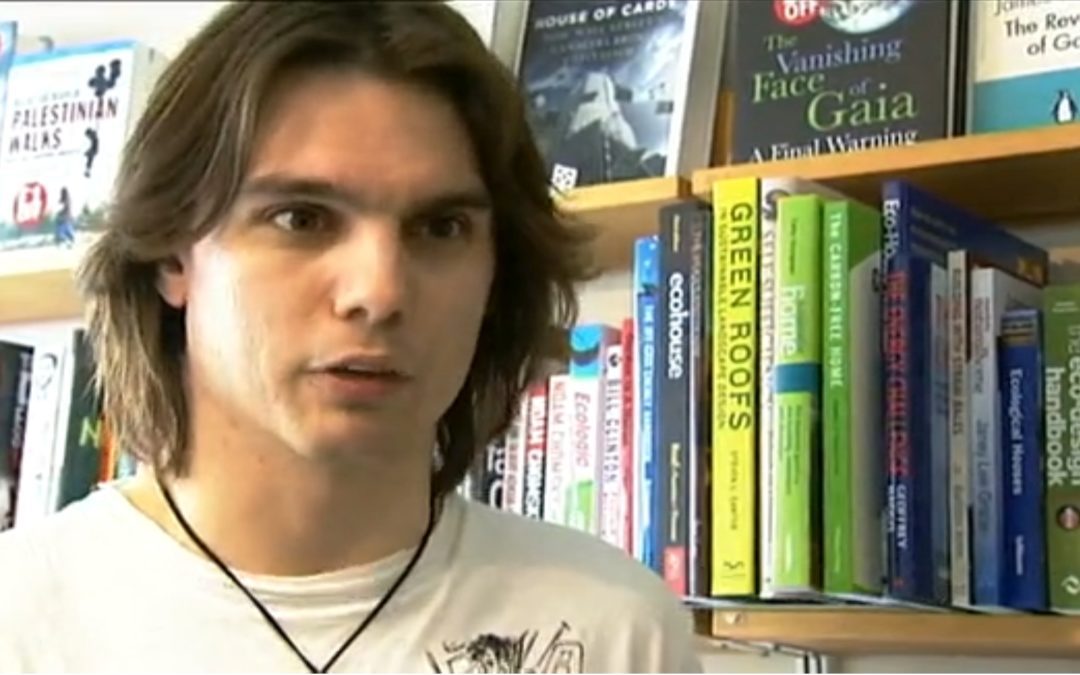
by Shaun Chamberlin | May 6, 2009 | All Posts, Cultural stories, Reviews and recommendations, Transition Movement
The latest version of the Transition Movie – In Transition 1.0 (post updated December 2009 to embed full movie – including an appearance from me around the 35 minute mark!)...
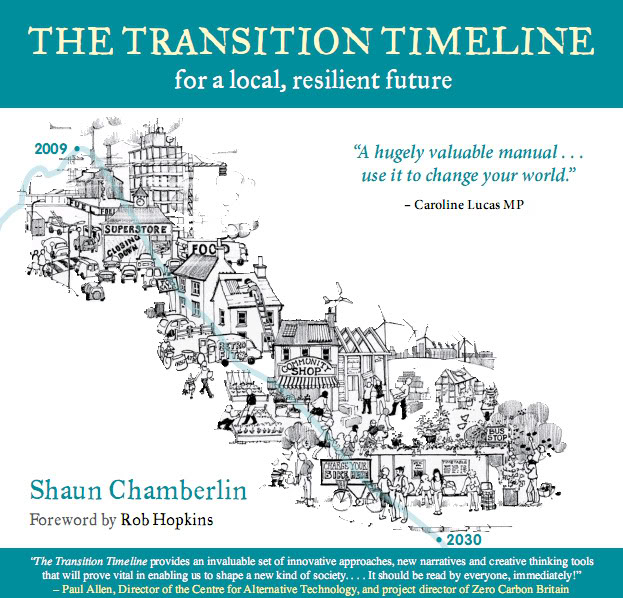
by Shaun Chamberlin | Apr 15, 2009 | All Posts, Favourite posts, Reviews and recommendations, The Transition Timeline, Transition Movement
The last month has been a bit of a blur, with very well-attended book launch events all over Britain, a two-day seminar at the Centre for Alternative Technology scoping out Zero Carbon Britain 2, more radio interviews, and even being caught on film for the first time (more practice required methinks!).
While I've been zipping around, a number of people have requested a more detailed write-up on The Transition Timeline than I have so far provided online, so let's take a closer look.
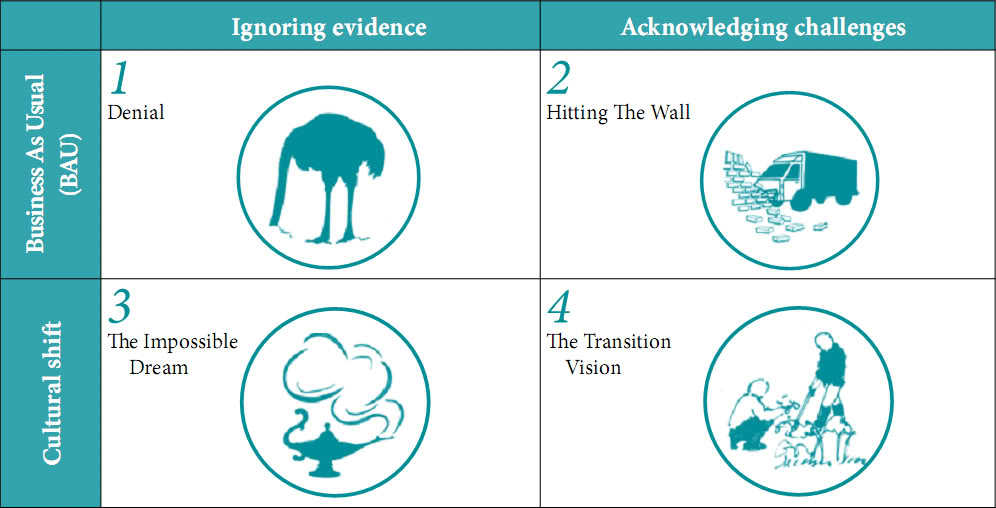 In overview, then, the first half of the book explores four different visions of how the next twenty years could pan out for the UK and world, before focusing on what might be considered the most desirable of these, the Transition Vision, and examining the practical details of this in depth. There is also a chapter here provided by Rob Hopkins, the originator of the Transition movement, in which he outlines the progress Transition initiatives have made to date, and provides a set of tools for communities working towards their local Energy Descent Action Plans (a key aspect of the Transition process).
The second half of the book provides a thoroughly researched yet readable exploration of the latest evidence and thinking on climate change and peak oil, and the interactions between the two, including a section focused on their present and future impacts in the UK, and on our Government's responses to date.
In overview, then, the first half of the book explores four different visions of how the next twenty years could pan out for the UK and world, before focusing on what might be considered the most desirable of these, the Transition Vision, and examining the practical details of this in depth. There is also a chapter here provided by Rob Hopkins, the originator of the Transition movement, in which he outlines the progress Transition initiatives have made to date, and provides a set of tools for communities working towards their local Energy Descent Action Plans (a key aspect of the Transition process).
The second half of the book provides a thoroughly researched yet readable exploration of the latest evidence and thinking on climate change and peak oil, and the interactions between the two, including a section focused on their present and future impacts in the UK, and on our Government's responses to date.
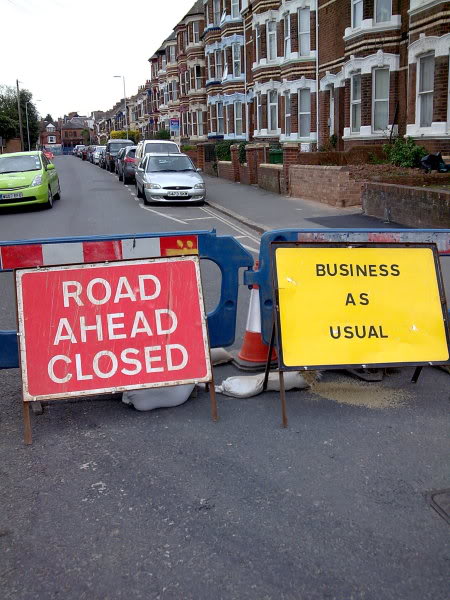 The book itself initially grew out of three motivations. Firstly, it was requested by existing Transition initiatives, who were trying to produce realistic positive visions of the future for their communities, but needed some input on the major trends facing the UK in our near-future – the kinds of things which are going to affect them but which may be hard for individual communities to directly affect (e.g. peak oil, government policy or UK food supply). Accordingly, the book provides a readable summary of the existing research in key areas of concern (e.g. population, food and water, energy, healthcare...), outlining the present position and trends before exploring possible futures.
The second impetus for the book was my personal concern about whether the Transition process is adequate to dealing with the sheer scale of the challenges we collectively face. This is a theme that runs throughout the book, as the process of writing was intimately bound up with my own exploration of this.
The final energy behind the book's creation was the desire to flesh out the Transition Vision. This concept was touched on in Rob's Transition Handbook, but Rob and I felt strongly that it needed to be developed further. Core to Transition is the idea that we need a positive realistic vision of the future to get us all out of bed in the morning, and I was very keen to make this feel more tangible and real by exploring the possibilities and challenges in more detail.
The book itself initially grew out of three motivations. Firstly, it was requested by existing Transition initiatives, who were trying to produce realistic positive visions of the future for their communities, but needed some input on the major trends facing the UK in our near-future – the kinds of things which are going to affect them but which may be hard for individual communities to directly affect (e.g. peak oil, government policy or UK food supply). Accordingly, the book provides a readable summary of the existing research in key areas of concern (e.g. population, food and water, energy, healthcare...), outlining the present position and trends before exploring possible futures.
The second impetus for the book was my personal concern about whether the Transition process is adequate to dealing with the sheer scale of the challenges we collectively face. This is a theme that runs throughout the book, as the process of writing was intimately bound up with my own exploration of this.
The final energy behind the book's creation was the desire to flesh out the Transition Vision. This concept was touched on in Rob's Transition Handbook, but Rob and I felt strongly that it needed to be developed further. Core to Transition is the idea that we need a positive realistic vision of the future to get us all out of bed in the morning, and I was very keen to make this feel more tangible and real by exploring the possibilities and challenges in more detail.
 This importance of this was reinforced for me mid-way through the drafting process when the Age of Stupid team brought a sneak preview of their film to the Transition Conference last year. The response was generally that it was a brilliant film, but that it was still focused on the "Denial" scenario and the awful places that could lead, without showing the audience the positive alternative.
Franny Armstrong, the film's director, agreed, and challenged us to flesh out that alternative vision to set alongside her film, so that people could clearly perceive the real choices we face. Those discussions stayed with me throughout the drafting process, and ultimately led to the tie-in between the launch of the film and the book, and Franny's comment that: "There is obviously no single, magic bullet solution to climate change. But if I was forced to choose one – our best hope of averting the crisis – it would definitely be Transition Towns."
This importance of this was reinforced for me mid-way through the drafting process when the Age of Stupid team brought a sneak preview of their film to the Transition Conference last year. The response was generally that it was a brilliant film, but that it was still focused on the "Denial" scenario and the awful places that could lead, without showing the audience the positive alternative.
Franny Armstrong, the film's director, agreed, and challenged us to flesh out that alternative vision to set alongside her film, so that people could clearly perceive the real choices we face. Those discussions stayed with me throughout the drafting process, and ultimately led to the tie-in between the launch of the film and the book, and Franny's comment that: "There is obviously no single, magic bullet solution to climate change. But if I was forced to choose one – our best hope of averting the crisis – it would definitely be Transition Towns."
 The Transition Vision we developed, then, is of a future in which we create a resilient, more localised society which avoids the worst potential of climate change and peak oil through building thriving lower-energy communities teeming with satisfying lifestyles and fulfilled people.
In the book I track this vision through a 'history of the next twenty years', examining population, demographics, food, water, energy, transport and healthcare, and then drawing together the common threads which appear to run through our near-future in all of these areas.
I should emphasise at this point that as the author I make no claim to any 'ownership' of this vision or timeline. It was developed in collaboration with as many Transitioners as I could manage to speak to, and represents and supports the learning and practical progress of the Transition movement as it continues to spread and mature. Now that I have pulled together a first draft, the never-ending process of developing the vision of the future we want to co-create for our communities and world is intended to continue as a collaborative project. This has already begun over at the Transition Forums, and in the near-future we plan to put the content of my book up on Appropedia, so that as many people as possible can collaborate in developing the second edition, just as has already been done with The Transition Handbook. We need as many heads, hearts and hands as possible working on our best responses to this unprecedented historical situation.
For me personally, one thing that has come out of the many long train journeys that I have taken this month has been a chance to actually read my own book! That may sound strange, but I found it is a very different experience to approach the book as a general reader than as a writer, proofreader etc. From this new perspective it seemed to me that the graph reproduced below represents perhaps the core shift in cultural perspective underlying the Transition Vision - that there is not a simple direct relationship between consumption and fulfilment.
The Transition Vision we developed, then, is of a future in which we create a resilient, more localised society which avoids the worst potential of climate change and peak oil through building thriving lower-energy communities teeming with satisfying lifestyles and fulfilled people.
In the book I track this vision through a 'history of the next twenty years', examining population, demographics, food, water, energy, transport and healthcare, and then drawing together the common threads which appear to run through our near-future in all of these areas.
I should emphasise at this point that as the author I make no claim to any 'ownership' of this vision or timeline. It was developed in collaboration with as many Transitioners as I could manage to speak to, and represents and supports the learning and practical progress of the Transition movement as it continues to spread and mature. Now that I have pulled together a first draft, the never-ending process of developing the vision of the future we want to co-create for our communities and world is intended to continue as a collaborative project. This has already begun over at the Transition Forums, and in the near-future we plan to put the content of my book up on Appropedia, so that as many people as possible can collaborate in developing the second edition, just as has already been done with The Transition Handbook. We need as many heads, hearts and hands as possible working on our best responses to this unprecedented historical situation.
For me personally, one thing that has come out of the many long train journeys that I have taken this month has been a chance to actually read my own book! That may sound strange, but I found it is a very different experience to approach the book as a general reader than as a writer, proofreader etc. From this new perspective it seemed to me that the graph reproduced below represents perhaps the core shift in cultural perspective underlying the Transition Vision - that there is not a simple direct relationship between consumption and fulfilment.
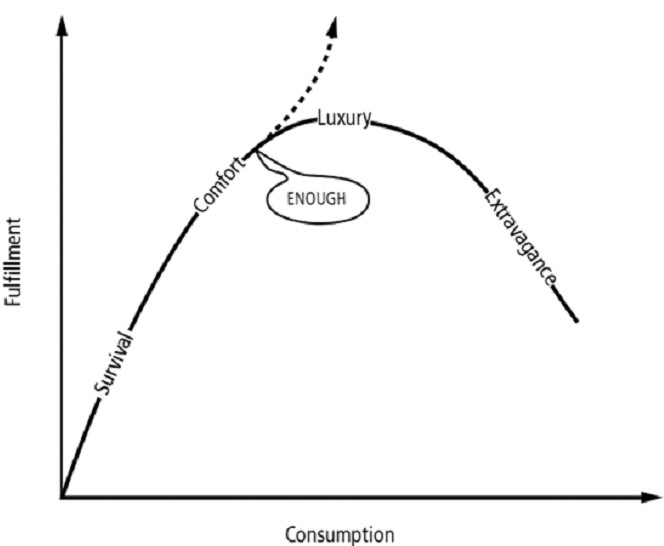 Reading through, and relying on my earlier research legwork, I found it was easy enough to trace our society's progression along this curve in each of the areas examined in the book, but what really struck me was the shift in the underlying message of this graph. I originally found the image in the 2002 essay The Great Transition, which in turn credits the 1992 book Your Money or Your Life, and the concepts behind it clearly hold a far longer heritage than that, yet there is a distinctly modern twist. While this graph used to make perhaps a fairly abstract point about the nature of fulfilment and well-being, in our modern world we can recognise that continuing on down the path of ever-greater consumption of energy and material resources now not only leads to lower levels of heartfelt satisfaction, but also to environmental devastation, massive mortality rates and widespread outright misery.
Working on The Transition Timeline has made it ever clearer to me that our choice now is between taking perhaps our last chance to enjoy a far happier, more satisfying world, or experiencing a vastly less desirable one - more of the same simply isn't an option. Here I am put in mind of Paul Wellstone's words, "If we don't fight hard enough for the things we stand for, at some point we have to recognise that we don't really stand for them".
This book was written for those communities who have already taken the brave decision to work for the future we all hope to live in, and I very much hope that it fills its intended role as a key tool supporting them - I feel privileged to have been entrusted with it.
--
Edit - for the range of online reviews and the opportunity to support my work by ordering a signed copy see here.
Reading through, and relying on my earlier research legwork, I found it was easy enough to trace our society's progression along this curve in each of the areas examined in the book, but what really struck me was the shift in the underlying message of this graph. I originally found the image in the 2002 essay The Great Transition, which in turn credits the 1992 book Your Money or Your Life, and the concepts behind it clearly hold a far longer heritage than that, yet there is a distinctly modern twist. While this graph used to make perhaps a fairly abstract point about the nature of fulfilment and well-being, in our modern world we can recognise that continuing on down the path of ever-greater consumption of energy and material resources now not only leads to lower levels of heartfelt satisfaction, but also to environmental devastation, massive mortality rates and widespread outright misery.
Working on The Transition Timeline has made it ever clearer to me that our choice now is between taking perhaps our last chance to enjoy a far happier, more satisfying world, or experiencing a vastly less desirable one - more of the same simply isn't an option. Here I am put in mind of Paul Wellstone's words, "If we don't fight hard enough for the things we stand for, at some point we have to recognise that we don't really stand for them".
This book was written for those communities who have already taken the brave decision to work for the future we all hope to live in, and I very much hope that it fills its intended role as a key tool supporting them - I feel privileged to have been entrusted with it.
--
Edit - for the range of online reviews and the opportunity to support my work by ordering a signed copy see here.
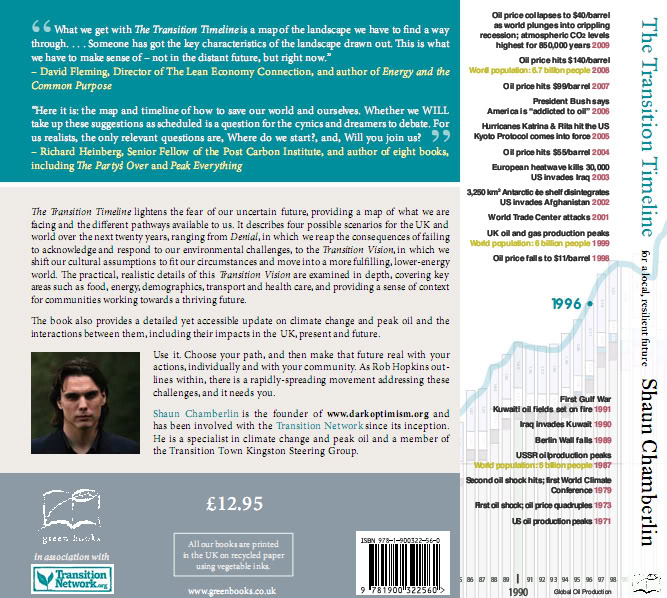 “Peak oil and climate change are two of the greatest challenges we face today; the Transition Town movement is firmly rooted in the idea that people taking action now in their communities can not only tackle these environmental threats but also, in the process of doing so, lead more fulfilling lives. It is about hope in an otherwise bleak seeming future. Above all, it's about the power of an alternative vision for how society could be and not waiting for government or politicians to get it right.
The Transition Timeline is designed to bring that vision to life – with stories of what communities have already achieved, with updates on the latest scientific data, and with ‘maps’ that highlight key landmarks on the journey towards a zero carbon future. It's a hugely valuable manual for anyone committed to turning dreams into reality. Don't just read this book – use it to change your world.”
~ Caroline Lucas MP, leader of the Green Party of England and Wales, and co-author of Green Alternatives to Globalisation: A Manifesto.
--
“Shaun Chamberlin ties down the uncertainties about climate, energy, food, water and population, the big scene-setters of our future, with no-nonsense authority. What we get with The Transition Timeline is a map of the landscape we have to find a way through. Map-making is a risky business: sooner or later someone is going to use your map and come across a treacherous swamp that isn’t marked. So you need to be alert to revisions and reports from travellers. But what matters is that someone has got the key characteristics of the landscape drawn out. This is what we have to make sense of – not in the distant future, but right now.
Don't set out without The Transition Timeline. Take a biro. Scribble updates, comments, expressions of shock and horror, notes to cheer yourself up. By the time your copy has been rained on, stained with blackberry juice, consulted, annotated, used to press and preserve a leaf of our autumnal world, you will have a good idea of where you are, and inspiration about where you are going. It is almost as good as getting there.”
~ Dr. David Fleming, director of The Lean Economy Connection, and author of Energy and the Common Purpose
--
“There is obviously no single, magic bullet solution to climate change. But if I was forced to choose one – our best hope of averting the crisis – it would definitely be Transition Towns.”
~ Franny Armstrong, Director of The Age of Stupid film
--
“Transition has emerged as perhaps the only real model we have for addressing our current crisis – a new, if vital, format for reconsidering our future. The Transition Timeline strengthens a fragile form, something that might, without a trace of irony, be called one of the last, best hopes for all of us.”
~ Sharon Astyk, author of Depletion and Abundance: Life on the New Home Front and A Nation of Farmers: Defeating the Food Crisis on American Soil
--
“Will the future be as rosy as The Transition Timeline suggests it might be? Will the people of Britain and the rest of the world begin immediately to make better decisions, taking the welfare of future generations into account? The answer to both questions is probably no.
Will serious repercussions of decisions already taken (regarding fossil fuel consumption and the structuring of our economy to depend on perpetual growth for its viability) come to bite us hard before we even have a chance to implement some of the excellent recommendations contained in this book? The answer to that one is certainly yes - we are already seeing dire consequences of past economic and energy decisions.
Nevertheless, without a vision of what can be, there is no alternative to a future completely constrained by the past. The ideal future set forth herein is not a useless pipe-dream. There is not a single outcome described in this book that could not realistically be achieved IF we all do things beginning now that are entirely within our ability to do.
So here it is: the map and timeline of how to save our world and ourselves. Whether we WILL take up these suggestions as scheduled is a question for the cynics and dreamers to debate. For us realists, the only relevant questions are, Where do we start?, and, Will you join us? ”
~ Richard Heinberg, Senior fellow of the Post Carbon Institute, and author of eight books, including The Party’s Over and Peak Everything
--
“The next 100 months will be a very special time for humanity. On numerous fronts, the consequences of the past 150 years of industrialisation are all simultaneously coming home to roost. Even senior experts, scientists, NGOs and political leaders fail to appreciate that the most recent evidence reveals a situation more urgent than had been expected, even by those who have been following it closely for decades. The Transition Timeline provides an invaluable set of innovative approaches, new narratives and creative thinking tools that will prove vital in enabling us to shape a new kind of society and a new kind of economy; stable in the long term, locally resilient, but still active in a global context, rich in quality jobs, a strong sense of purpose and reliant on indigenous, in-exhaustible energy. It should be read by everyone, immediately!”
~ Paul Allen, director of the Centre for Alternative Technology, and project director of Zero Carbon Britain
“Peak oil and climate change are two of the greatest challenges we face today; the Transition Town movement is firmly rooted in the idea that people taking action now in their communities can not only tackle these environmental threats but also, in the process of doing so, lead more fulfilling lives. It is about hope in an otherwise bleak seeming future. Above all, it's about the power of an alternative vision for how society could be and not waiting for government or politicians to get it right.
The Transition Timeline is designed to bring that vision to life – with stories of what communities have already achieved, with updates on the latest scientific data, and with ‘maps’ that highlight key landmarks on the journey towards a zero carbon future. It's a hugely valuable manual for anyone committed to turning dreams into reality. Don't just read this book – use it to change your world.”
~ Caroline Lucas MP, leader of the Green Party of England and Wales, and co-author of Green Alternatives to Globalisation: A Manifesto.
--
“Shaun Chamberlin ties down the uncertainties about climate, energy, food, water and population, the big scene-setters of our future, with no-nonsense authority. What we get with The Transition Timeline is a map of the landscape we have to find a way through. Map-making is a risky business: sooner or later someone is going to use your map and come across a treacherous swamp that isn’t marked. So you need to be alert to revisions and reports from travellers. But what matters is that someone has got the key characteristics of the landscape drawn out. This is what we have to make sense of – not in the distant future, but right now.
Don't set out without The Transition Timeline. Take a biro. Scribble updates, comments, expressions of shock and horror, notes to cheer yourself up. By the time your copy has been rained on, stained with blackberry juice, consulted, annotated, used to press and preserve a leaf of our autumnal world, you will have a good idea of where you are, and inspiration about where you are going. It is almost as good as getting there.”
~ Dr. David Fleming, director of The Lean Economy Connection, and author of Energy and the Common Purpose
--
“There is obviously no single, magic bullet solution to climate change. But if I was forced to choose one – our best hope of averting the crisis – it would definitely be Transition Towns.”
~ Franny Armstrong, Director of The Age of Stupid film
--
“Transition has emerged as perhaps the only real model we have for addressing our current crisis – a new, if vital, format for reconsidering our future. The Transition Timeline strengthens a fragile form, something that might, without a trace of irony, be called one of the last, best hopes for all of us.”
~ Sharon Astyk, author of Depletion and Abundance: Life on the New Home Front and A Nation of Farmers: Defeating the Food Crisis on American Soil
--
“Will the future be as rosy as The Transition Timeline suggests it might be? Will the people of Britain and the rest of the world begin immediately to make better decisions, taking the welfare of future generations into account? The answer to both questions is probably no.
Will serious repercussions of decisions already taken (regarding fossil fuel consumption and the structuring of our economy to depend on perpetual growth for its viability) come to bite us hard before we even have a chance to implement some of the excellent recommendations contained in this book? The answer to that one is certainly yes - we are already seeing dire consequences of past economic and energy decisions.
Nevertheless, without a vision of what can be, there is no alternative to a future completely constrained by the past. The ideal future set forth herein is not a useless pipe-dream. There is not a single outcome described in this book that could not realistically be achieved IF we all do things beginning now that are entirely within our ability to do.
So here it is: the map and timeline of how to save our world and ourselves. Whether we WILL take up these suggestions as scheduled is a question for the cynics and dreamers to debate. For us realists, the only relevant questions are, Where do we start?, and, Will you join us? ”
~ Richard Heinberg, Senior fellow of the Post Carbon Institute, and author of eight books, including The Party’s Over and Peak Everything
--
“The next 100 months will be a very special time for humanity. On numerous fronts, the consequences of the past 150 years of industrialisation are all simultaneously coming home to roost. Even senior experts, scientists, NGOs and political leaders fail to appreciate that the most recent evidence reveals a situation more urgent than had been expected, even by those who have been following it closely for decades. The Transition Timeline provides an invaluable set of innovative approaches, new narratives and creative thinking tools that will prove vital in enabling us to shape a new kind of society and a new kind of economy; stable in the long term, locally resilient, but still active in a global context, rich in quality jobs, a strong sense of purpose and reliant on indigenous, in-exhaustible energy. It should be read by everyone, immediately!”
~ Paul Allen, director of the Centre for Alternative Technology, and project director of Zero Carbon Britain





 When we buttonholed him for a bit of a chat (audio here, courtesy of Traydio.com), I was pleased to hear that he understood the need for Government to remain a step removed from the Transition movement in order to avoid "strangling" it. However, I must confess I had to refrain from gasping as he declared that:
"If you think about the history of the debate on peak oil as I understand it, climate change makes debate about peak oil a bit of a second-order debate, because we have to start making the transition to low carbon forms of energy in any case. Whether you think that peak oil's in 2020, 2030 or 2040... I don't need to have the debate about peak oil... to know that we have to start making the transition as quickly as possible."
Where to begin? Clearly Ed's understanding of the history of the peak oil debate differs a little from mine. Let's start with the obvious - with many experts agreeing that we likely saw peak oil last year, for our Minister for Energy to be pondering how many decades in the future it might lie is, frankly, terrifying.
But what I personally find even more worrying is that he (and thus presumably his department) has not yet grasped that climate change and peak oil often pull in opposite directions. Perhaps Ed should cast his eyes across the Atlantic to the US Congress, where the advocates of Climate Change Bills (to implement strict carbon budgets) are doing battle with the champions of Energy Independence Bills (to subsidise carbon-intensive tar sands and coal-to-liquids projects).
When we buttonholed him for a bit of a chat (audio here, courtesy of Traydio.com), I was pleased to hear that he understood the need for Government to remain a step removed from the Transition movement in order to avoid "strangling" it. However, I must confess I had to refrain from gasping as he declared that:
"If you think about the history of the debate on peak oil as I understand it, climate change makes debate about peak oil a bit of a second-order debate, because we have to start making the transition to low carbon forms of energy in any case. Whether you think that peak oil's in 2020, 2030 or 2040... I don't need to have the debate about peak oil... to know that we have to start making the transition as quickly as possible."
Where to begin? Clearly Ed's understanding of the history of the peak oil debate differs a little from mine. Let's start with the obvious - with many experts agreeing that we likely saw peak oil last year, for our Minister for Energy to be pondering how many decades in the future it might lie is, frankly, terrifying.
But what I personally find even more worrying is that he (and thus presumably his department) has not yet grasped that climate change and peak oil often pull in opposite directions. Perhaps Ed should cast his eyes across the Atlantic to the US Congress, where the advocates of Climate Change Bills (to implement strict carbon budgets) are doing battle with the champions of Energy Independence Bills (to subsidise carbon-intensive tar sands and coal-to-liquids projects).
 As I wrote here last year, and more recently in The Transition Timeline, there is a very real tension between addressing climate change and addressing peak oil, and policy based purely on one side of this equation could be very destructive indeed. Unfortunately, our government is still caught on the horns of this 'supply side dilemma', and is desperately casting around for more rapidly-deployable low-carbon energy supplies.
It is only slowly dawning on them that renewable supply cannot increase as fast as oil and gas are declining, that nuclear only makes the problem worse, and that coal is not an option if we want a habitable planet. The inescapable conclusion is that if we are to treat climate change with the seriousness which it undoubtedly deserves, then we may well have already entered our years of energy descent. The only reasonable response is to find ways to thrive in this context - to reduce energy demand in line with the reducing supply - but as yet Ed still believes that only Denial sells to the voting public:
"In a way I'm less optimistic than you are... you're optimistic that you can persuade people to adopt a sort of "no growth" model of society - I'm pretty convinced that you couldn't persuade people of that... Even if you were right about your model of society, I just don't believe that you're going to convince people of that"
Actually, I do agree with Ed that we need to think long and hard about what "economic growth" actually means before we debate whether we want it, though I'm not sure we'll see eye-to-eye when that debate reaches its head.
Of course it doesn't come as an overwhelming surprise to see my perspective deemed darker yet more optimistic than the Government view, but since the Transition Vision of the future seems about the only desirable outcome out there to shoot for, I think I'll just keep right on shooting, whether Ed rates our chances or not.
Having said that, with Rob's recent post on 'burn out' in mind, it's definitely time for a day off for me. Tomorrow is my birthday, and I will be taking a hard-earned breather at Kew Gardens with my beautiful and inspirational girlfriend. Back soon!
As I wrote here last year, and more recently in The Transition Timeline, there is a very real tension between addressing climate change and addressing peak oil, and policy based purely on one side of this equation could be very destructive indeed. Unfortunately, our government is still caught on the horns of this 'supply side dilemma', and is desperately casting around for more rapidly-deployable low-carbon energy supplies.
It is only slowly dawning on them that renewable supply cannot increase as fast as oil and gas are declining, that nuclear only makes the problem worse, and that coal is not an option if we want a habitable planet. The inescapable conclusion is that if we are to treat climate change with the seriousness which it undoubtedly deserves, then we may well have already entered our years of energy descent. The only reasonable response is to find ways to thrive in this context - to reduce energy demand in line with the reducing supply - but as yet Ed still believes that only Denial sells to the voting public:
"In a way I'm less optimistic than you are... you're optimistic that you can persuade people to adopt a sort of "no growth" model of society - I'm pretty convinced that you couldn't persuade people of that... Even if you were right about your model of society, I just don't believe that you're going to convince people of that"
Actually, I do agree with Ed that we need to think long and hard about what "economic growth" actually means before we debate whether we want it, though I'm not sure we'll see eye-to-eye when that debate reaches its head.
Of course it doesn't come as an overwhelming surprise to see my perspective deemed darker yet more optimistic than the Government view, but since the Transition Vision of the future seems about the only desirable outcome out there to shoot for, I think I'll just keep right on shooting, whether Ed rates our chances or not.
Having said that, with Rob's recent post on 'burn out' in mind, it's definitely time for a day off for me. Tomorrow is my birthday, and I will be taking a hard-earned breather at Kew Gardens with my beautiful and inspirational girlfriend. Back soon!



 In overview, then, the first half of the book explores four different visions of how the next twenty years could pan out for the UK and world, before focusing on what might be considered the most desirable of these, the Transition Vision, and examining the practical details of this in depth. There is also a chapter here provided by Rob Hopkins, the originator of the Transition movement, in which he outlines the progress Transition initiatives have made to date, and provides a set of tools for communities working towards their local Energy Descent Action Plans (a key aspect of the Transition process).
The second half of the book provides a thoroughly researched yet readable exploration of the latest evidence and thinking on climate change and peak oil, and the interactions between the two, including a section focused on their present and future impacts in the UK, and on our Government's responses to date.
In overview, then, the first half of the book explores four different visions of how the next twenty years could pan out for the UK and world, before focusing on what might be considered the most desirable of these, the Transition Vision, and examining the practical details of this in depth. There is also a chapter here provided by Rob Hopkins, the originator of the Transition movement, in which he outlines the progress Transition initiatives have made to date, and provides a set of tools for communities working towards their local Energy Descent Action Plans (a key aspect of the Transition process).
The second half of the book provides a thoroughly researched yet readable exploration of the latest evidence and thinking on climate change and peak oil, and the interactions between the two, including a section focused on their present and future impacts in the UK, and on our Government's responses to date.
 The book itself initially grew out of three motivations. Firstly, it was requested by existing Transition initiatives, who were trying to produce realistic positive visions of the future for their communities, but needed some input on the major trends facing the UK in our near-future – the kinds of things which are going to affect them but which may be hard for individual communities to directly affect (e.g. peak oil, government policy or UK food supply). Accordingly, the book provides a readable summary of the existing research in key areas of concern (e.g. population, food and water, energy, healthcare...), outlining the present position and trends before exploring possible futures.
The second impetus for the book was my personal concern about whether the Transition process is adequate to dealing with the sheer scale of the challenges we collectively face. This is a theme that runs throughout the book, as the process of writing was intimately bound up with my own exploration of this.
The final energy behind the book's creation was the desire to flesh out the Transition Vision. This concept was touched on in Rob's Transition Handbook, but Rob and I felt strongly that it needed to be developed further. Core to Transition is the idea that we need a positive realistic vision of the future to get us all out of bed in the morning, and I was very keen to make this feel more tangible and real by exploring the possibilities and challenges in more detail.
The book itself initially grew out of three motivations. Firstly, it was requested by existing Transition initiatives, who were trying to produce realistic positive visions of the future for their communities, but needed some input on the major trends facing the UK in our near-future – the kinds of things which are going to affect them but which may be hard for individual communities to directly affect (e.g. peak oil, government policy or UK food supply). Accordingly, the book provides a readable summary of the existing research in key areas of concern (e.g. population, food and water, energy, healthcare...), outlining the present position and trends before exploring possible futures.
The second impetus for the book was my personal concern about whether the Transition process is adequate to dealing with the sheer scale of the challenges we collectively face. This is a theme that runs throughout the book, as the process of writing was intimately bound up with my own exploration of this.
The final energy behind the book's creation was the desire to flesh out the Transition Vision. This concept was touched on in Rob's Transition Handbook, but Rob and I felt strongly that it needed to be developed further. Core to Transition is the idea that we need a positive realistic vision of the future to get us all out of bed in the morning, and I was very keen to make this feel more tangible and real by exploring the possibilities and challenges in more detail.
 This importance of this was reinforced for me mid-way through the drafting process when the Age of Stupid team brought a sneak preview of their film to the Transition Conference last year. The response was generally that it was a brilliant film, but that it was still focused on the "Denial" scenario and the awful places that could lead, without showing the audience the positive alternative.
Franny Armstrong, the film's director, agreed, and challenged us to flesh out that alternative vision to set alongside her film, so that people could clearly perceive the real choices we face. Those discussions stayed with me throughout the drafting process, and ultimately led to the tie-in between the launch of the film and the book, and Franny's comment that: "There is obviously no single, magic bullet solution to climate change. But if I was forced to choose one – our best hope of averting the crisis – it would definitely be Transition Towns."
This importance of this was reinforced for me mid-way through the drafting process when the Age of Stupid team brought a sneak preview of their film to the Transition Conference last year. The response was generally that it was a brilliant film, but that it was still focused on the "Denial" scenario and the awful places that could lead, without showing the audience the positive alternative.
Franny Armstrong, the film's director, agreed, and challenged us to flesh out that alternative vision to set alongside her film, so that people could clearly perceive the real choices we face. Those discussions stayed with me throughout the drafting process, and ultimately led to the tie-in between the launch of the film and the book, and Franny's comment that: "There is obviously no single, magic bullet solution to climate change. But if I was forced to choose one – our best hope of averting the crisis – it would definitely be Transition Towns."

 Reading through, and relying on my earlier research legwork, I found it was easy enough to trace our society's progression along this curve in each of the areas examined in the book, but what really struck me was the shift in the underlying message of this graph. I originally found the image in the 2002 essay The Great Transition, which in turn credits the 1992 book Your Money or Your Life, and the concepts behind it clearly hold a far longer heritage than that, yet there is a distinctly modern twist. While this graph used to make perhaps a fairly abstract point about the nature of fulfilment and well-being, in our modern world we can recognise that continuing on down the path of ever-greater consumption of energy and material resources now not only leads to lower levels of heartfelt satisfaction, but also to environmental devastation, massive mortality rates and widespread outright misery.
Working on The Transition Timeline has made it ever clearer to me that our choice now is between taking perhaps our last chance to enjoy a far happier, more satisfying world, or experiencing a vastly less desirable one - more of the same simply isn't an option. Here I am put in mind of Paul Wellstone's words, "If we don't fight hard enough for the things we stand for, at some point we have to recognise that we don't really stand for them".
This book was written for those communities who have already taken the brave decision to work for the future we all hope to live in, and I very much hope that it fills its intended role as a key tool supporting them - I feel privileged to have been entrusted with it.
--
Edit - for the range of online reviews and the opportunity to support my work by ordering a signed copy see here.
Reading through, and relying on my earlier research legwork, I found it was easy enough to trace our society's progression along this curve in each of the areas examined in the book, but what really struck me was the shift in the underlying message of this graph. I originally found the image in the 2002 essay The Great Transition, which in turn credits the 1992 book Your Money or Your Life, and the concepts behind it clearly hold a far longer heritage than that, yet there is a distinctly modern twist. While this graph used to make perhaps a fairly abstract point about the nature of fulfilment and well-being, in our modern world we can recognise that continuing on down the path of ever-greater consumption of energy and material resources now not only leads to lower levels of heartfelt satisfaction, but also to environmental devastation, massive mortality rates and widespread outright misery.
Working on The Transition Timeline has made it ever clearer to me that our choice now is between taking perhaps our last chance to enjoy a far happier, more satisfying world, or experiencing a vastly less desirable one - more of the same simply isn't an option. Here I am put in mind of Paul Wellstone's words, "If we don't fight hard enough for the things we stand for, at some point we have to recognise that we don't really stand for them".
This book was written for those communities who have already taken the brave decision to work for the future we all hope to live in, and I very much hope that it fills its intended role as a key tool supporting them - I feel privileged to have been entrusted with it.
--
Edit - for the range of online reviews and the opportunity to support my work by ordering a signed copy see here.
 “Peak oil and climate change are two of the greatest challenges we face today; the Transition Town movement is firmly rooted in the idea that people taking action now in their communities can not only tackle these environmental threats but also, in the process of doing so, lead more fulfilling lives. It is about hope in an otherwise bleak seeming future. Above all, it's about the power of an alternative vision for how society could be and not waiting for government or politicians to get it right.
The Transition Timeline is designed to bring that vision to life – with stories of what communities have already achieved, with updates on the latest scientific data, and with ‘maps’ that highlight key landmarks on the journey towards a zero carbon future. It's a hugely valuable manual for anyone committed to turning dreams into reality. Don't just read this book – use it to change your world.”
~ Caroline Lucas MP, leader of the Green Party of England and Wales, and co-author of Green Alternatives to Globalisation: A Manifesto.
--
“Shaun Chamberlin ties down the uncertainties about climate, energy, food, water and population, the big scene-setters of our future, with no-nonsense authority. What we get with The Transition Timeline is a map of the landscape we have to find a way through. Map-making is a risky business: sooner or later someone is going to use your map and come across a treacherous swamp that isn’t marked. So you need to be alert to revisions and reports from travellers. But what matters is that someone has got the key characteristics of the landscape drawn out. This is what we have to make sense of – not in the distant future, but right now.
Don't set out without The Transition Timeline. Take a biro. Scribble updates, comments, expressions of shock and horror, notes to cheer yourself up. By the time your copy has been rained on, stained with blackberry juice, consulted, annotated, used to press and preserve a leaf of our autumnal world, you will have a good idea of where you are, and inspiration about where you are going. It is almost as good as getting there.”
~ Dr. David Fleming, director of The Lean Economy Connection, and author of Energy and the Common Purpose
--
“There is obviously no single, magic bullet solution to climate change. But if I was forced to choose one – our best hope of averting the crisis – it would definitely be Transition Towns.”
~ Franny Armstrong, Director of The Age of Stupid film
--
“Transition has emerged as perhaps the only real model we have for addressing our current crisis – a new, if vital, format for reconsidering our future. The Transition Timeline strengthens a fragile form, something that might, without a trace of irony, be called one of the last, best hopes for all of us.”
~ Sharon Astyk, author of Depletion and Abundance: Life on the New Home Front and A Nation of Farmers: Defeating the Food Crisis on American Soil
--
“Will the future be as rosy as The Transition Timeline suggests it might be? Will the people of Britain and the rest of the world begin immediately to make better decisions, taking the welfare of future generations into account? The answer to both questions is probably no.
Will serious repercussions of decisions already taken (regarding fossil fuel consumption and the structuring of our economy to depend on perpetual growth for its viability) come to bite us hard before we even have a chance to implement some of the excellent recommendations contained in this book? The answer to that one is certainly yes - we are already seeing dire consequences of past economic and energy decisions.
Nevertheless, without a vision of what can be, there is no alternative to a future completely constrained by the past. The ideal future set forth herein is not a useless pipe-dream. There is not a single outcome described in this book that could not realistically be achieved IF we all do things beginning now that are entirely within our ability to do.
So here it is: the map and timeline of how to save our world and ourselves. Whether we WILL take up these suggestions as scheduled is a question for the cynics and dreamers to debate. For us realists, the only relevant questions are, Where do we start?, and, Will you join us? ”
~ Richard Heinberg, Senior fellow of the Post Carbon Institute, and author of eight books, including The Party’s Over and Peak Everything
--
“The next 100 months will be a very special time for humanity. On numerous fronts, the consequences of the past 150 years of industrialisation are all simultaneously coming home to roost. Even senior experts, scientists, NGOs and political leaders fail to appreciate that the most recent evidence reveals a situation more urgent than had been expected, even by those who have been following it closely for decades. The Transition Timeline provides an invaluable set of innovative approaches, new narratives and creative thinking tools that will prove vital in enabling us to shape a new kind of society and a new kind of economy; stable in the long term, locally resilient, but still active in a global context, rich in quality jobs, a strong sense of purpose and reliant on indigenous, in-exhaustible energy. It should be read by everyone, immediately!”
~ Paul Allen, director of the Centre for Alternative Technology, and project director of Zero Carbon Britain
“Peak oil and climate change are two of the greatest challenges we face today; the Transition Town movement is firmly rooted in the idea that people taking action now in their communities can not only tackle these environmental threats but also, in the process of doing so, lead more fulfilling lives. It is about hope in an otherwise bleak seeming future. Above all, it's about the power of an alternative vision for how society could be and not waiting for government or politicians to get it right.
The Transition Timeline is designed to bring that vision to life – with stories of what communities have already achieved, with updates on the latest scientific data, and with ‘maps’ that highlight key landmarks on the journey towards a zero carbon future. It's a hugely valuable manual for anyone committed to turning dreams into reality. Don't just read this book – use it to change your world.”
~ Caroline Lucas MP, leader of the Green Party of England and Wales, and co-author of Green Alternatives to Globalisation: A Manifesto.
--
“Shaun Chamberlin ties down the uncertainties about climate, energy, food, water and population, the big scene-setters of our future, with no-nonsense authority. What we get with The Transition Timeline is a map of the landscape we have to find a way through. Map-making is a risky business: sooner or later someone is going to use your map and come across a treacherous swamp that isn’t marked. So you need to be alert to revisions and reports from travellers. But what matters is that someone has got the key characteristics of the landscape drawn out. This is what we have to make sense of – not in the distant future, but right now.
Don't set out without The Transition Timeline. Take a biro. Scribble updates, comments, expressions of shock and horror, notes to cheer yourself up. By the time your copy has been rained on, stained with blackberry juice, consulted, annotated, used to press and preserve a leaf of our autumnal world, you will have a good idea of where you are, and inspiration about where you are going. It is almost as good as getting there.”
~ Dr. David Fleming, director of The Lean Economy Connection, and author of Energy and the Common Purpose
--
“There is obviously no single, magic bullet solution to climate change. But if I was forced to choose one – our best hope of averting the crisis – it would definitely be Transition Towns.”
~ Franny Armstrong, Director of The Age of Stupid film
--
“Transition has emerged as perhaps the only real model we have for addressing our current crisis – a new, if vital, format for reconsidering our future. The Transition Timeline strengthens a fragile form, something that might, without a trace of irony, be called one of the last, best hopes for all of us.”
~ Sharon Astyk, author of Depletion and Abundance: Life on the New Home Front and A Nation of Farmers: Defeating the Food Crisis on American Soil
--
“Will the future be as rosy as The Transition Timeline suggests it might be? Will the people of Britain and the rest of the world begin immediately to make better decisions, taking the welfare of future generations into account? The answer to both questions is probably no.
Will serious repercussions of decisions already taken (regarding fossil fuel consumption and the structuring of our economy to depend on perpetual growth for its viability) come to bite us hard before we even have a chance to implement some of the excellent recommendations contained in this book? The answer to that one is certainly yes - we are already seeing dire consequences of past economic and energy decisions.
Nevertheless, without a vision of what can be, there is no alternative to a future completely constrained by the past. The ideal future set forth herein is not a useless pipe-dream. There is not a single outcome described in this book that could not realistically be achieved IF we all do things beginning now that are entirely within our ability to do.
So here it is: the map and timeline of how to save our world and ourselves. Whether we WILL take up these suggestions as scheduled is a question for the cynics and dreamers to debate. For us realists, the only relevant questions are, Where do we start?, and, Will you join us? ”
~ Richard Heinberg, Senior fellow of the Post Carbon Institute, and author of eight books, including The Party’s Over and Peak Everything
--
“The next 100 months will be a very special time for humanity. On numerous fronts, the consequences of the past 150 years of industrialisation are all simultaneously coming home to roost. Even senior experts, scientists, NGOs and political leaders fail to appreciate that the most recent evidence reveals a situation more urgent than had been expected, even by those who have been following it closely for decades. The Transition Timeline provides an invaluable set of innovative approaches, new narratives and creative thinking tools that will prove vital in enabling us to shape a new kind of society and a new kind of economy; stable in the long term, locally resilient, but still active in a global context, rich in quality jobs, a strong sense of purpose and reliant on indigenous, in-exhaustible energy. It should be read by everyone, immediately!”
~ Paul Allen, director of the Centre for Alternative Technology, and project director of Zero Carbon Britain

Recent Comments